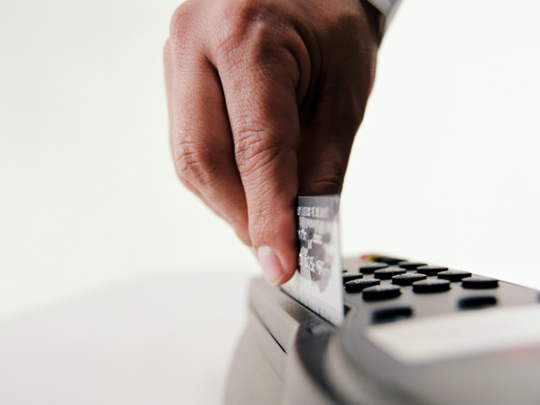
Abu Dhabi: Credit cards offered by banks in the UAE have some of the highest interest rates worldwide with some banks charging above 36 per cent as annual interest rates, according to some customers.
Nabeel Barakat, a senior financial analyst at Al Fajr Securities, told Gulf News that the interest rates on credit cards in the UAE are very high compared to the United States.
“The rates on credit cards in the UAE are very high compared to the USA where they range from 19 per cent annually up to 30 per cent depending on commitment to pay back the loan. If the client regularly pays the amount due, the rate will be around 19 per cent,” said Barakat.
He also blamed the clients for overusing or abusing the credit cards on various occasions and these cards are a different kettle of fish.
“The clients should only use the cards in emergency cases and not to use them as they are commonly used in the UAE for luxury and for purchasing unnecessary items,” Barakat pointed out.
He said that the credit market in the UAE needs to be reorganized because fees and interest rates imposed by local banks on these services are too high and not unified.
A banker, who preferred to be anonymous, told Gulf News that profits made of credit cards are higher than personal loans.
“We advise those who really belong to us such as friends and relatives to offset their card loans and take a personal loan instead as the interest on the personal loan is not more than 7 per cent while it is more than 30 per cent annually on the credit card loan,” the banker commented.
He added that in 2012, the banking sector had benefited from the higher interest rates of credit cards which positively reflected upon their revenues and the net profits.
The number of credit cards in 2012 was more than 10.4 million, with an increase of 296,000 cards compared to 2011. By comparison, Saudi Arabia had about 15 million cards at the end of 2012.
“The population of KSA is 25 million compared to 8 million in the UAE. If we divide the 15 million on population of KSA, this gives us a ratio of 0.6 per cent. On the other hand, the percentage in the card holders in the UAE is much higher once we divide the 10.4 million on 8 million people in the UAE to give us 1.3 cards. In other words, that is double the percentage of KSA,” the banker elucidated.
A survey by the Gulf News to determine credit card rates in the UAE and the GCC, the USA and the UK found that the interest rates in the UAE are higher than any of these countries.
“The National Bank of Abu Dhabi’s credit card rates start from 1.59 per month which is 19.08 per cent annually. The Abu Dhabi Islamic Bank’s credit card rates range from 2.8 per cent to 3 per cent monthly, which is 33.6 per cent to 36 per cent annually, excluding the annual charges and any extra fees. The First Gulf Bank credit card rates range from 2.75 per cent to 2.99 per cent monthly, 33 per cent and 35.88 per cent annually respectively,” the survey stated.
“A large number of banks in the UAE charge well above 36 per cent per year, or 3 per cent per month,” the survey revealed.
The GCC banks charge an average 18 per cent annually, which is 1.5 per cent a month. For example, the Ahli Bank of Kuwait and the National Bank of Kuwait charge 18-20 per cent annually, while the banks in Saudi Arabia charge from 19-24. For Al Rajihi Bank, it ranges from 18-20, and for other banks it is up to 24 per cent.
The survey shows that the UK average credit card interest rate ranges from 15.9 per cent - 19.1 per cent annually.
Clients
“While most international banks charge between 9-12 per cent, and GCC banks charge an average 18 per cent annually, many banks in the UAE charge more than 3 per cent a month or 36 per cent per year, which is a very high percentage,” showed the survey.
Ahmad Mohammad, an NBAD client, told Gulf News that he approached the National Bank of Abu Dhabi three years ago asking for a loan. His request was refused as he was new in town. They offered him a credit card instead.
“I was offered a credit card. With a ceiling of Dh20,000. After signing so many papers without reading a single statement, of course as this is quite a common thing to do at banks, I was lucky enough to get the card after five days,” said Mohammad.
He added that he was paying every due amount on time as it was deducted directly from his salary. Then, he suddenly wanted to check how much of his loan he paid.
“To my surprise, I only paid the interest rate after three years, which means that the interest plus the other fees are more than 40 per cent annually. Surprisingly enough, while checking my withdrawals, I found that they deducted monthly an amount called premium fee which, when I asked was a fee in case I got sick in the future,’’ complained Mohammad.
He pointed out he called the call centre to stop this fee if possible, and he was informed that all the amounts deducted are not refunded.
A Citibank client, Jessica Robinson, pays her dues on time to the bank through an exchange house.
“Though I pay two or three days ahead, there is a monthly charge appearing on my statement as late fees. When I complained about this, they told me because I was late in payment. My instalment is on the second day of every month and I pay end of the month when my salary is transferred to the bank via exchange house. Is it my fault or the exchange house’s fault,” wondered Robinson
Get rid of the card
With regard to the annual interest rate, she said that in the beginning when the amounts withdrawn were moderate, the interest rate was acceptable as premiums were low; this has soon changed when I withdrew more than Dh30,000.
“I have been paying for a year now and the principal amount is still the same,” Robinson commented.
A bank source, who declined to be named, told Gulf News, that he believed interest rates on cards are higher than any other country in the world.
“A Dh10,000 balance by end of the year is more than Dh14,000. Therefore, the client pays back the interest and believes he is paying he principal amount which is untrue. He is paying the interest only and the remaining is the principal amount. The best thing is to pay bigger amounts and get rid of the card sooner than later,” he advised.
Amer Mansour, an HSCB client, said that the interest rate charged ranges from 2.79 -2.99 per cent, which means, if paid regularly, they are 33.48 per cent and 35.88 per cent annually.
“This a high rate and the annual fee ranges from Dh400 –600 in addition to late payment fees and charges which are not stated when one signs the agreement with the bank to get a visa card. When any bank sells a visa or a master card to the client, they only tell you the benefits you get, without resorting to demerits or charges that they take,” Mansour said.












